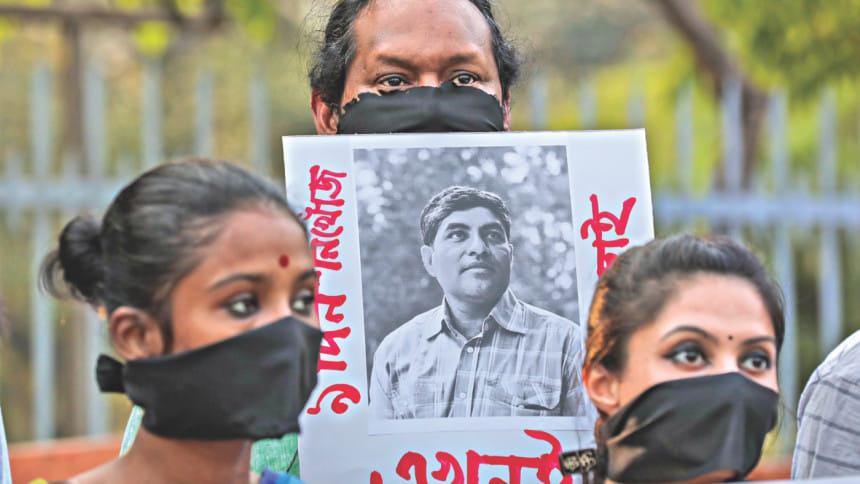One more nail in the coffin of free press

A barrage of fireworks light up the smoggy skies of Dhaka and I feel as if I'm in the opening scenes of a dystopian film.
There's anxiety and despair all around about what's to come—those who have been following the developments in other parts of the world know there's no way to avoid the impending crisis in our healthcare system as it scrambles, without any preparation, to tackle what may soon become a tsunami of patients showcasing symptoms of the coronavirus. The streets are uncharacteristically empty, and the rickshaw puller, for whom self-quarantine would mean the loss of his daily wages on which his family of five depend, asks me if I know how much these pyrotechnics cost.
Our conversation is silenced by the loud explosions. Yes, I remind myself, celebrations must go on—priorities are priorities, after all—and I know better than to mention the unmentionable, even in a private conversation with a rickshaw puller, even on social media and particularly in opinion pieces published in The Daily Star. The nagging thought that I'm trapped in a dystopia returns as, with each firework that sounds like a gunshot, my mind finds itself ruminating over the fate of photojournalist Shafiqul Islam Kajol, who has been missing since March 10, 2020. The coronavirus crisis and the resultant chaos and mismanagement have understandably taken over the news, and while we worry about what will happen to our loved ones if the virus spreads beyond control, Shafiqul's son has been living an unimaginable nightmare of his own, not knowing where his father is and whether he is still alive.
Kajol is the editor of a fortnightly magazine called Pakkhakal, with past experience in working as a photojournalist with Dainik Samakal and Banik Barta. He "disappeared" a day after a case was filed against him and 31 others, including the editor-in-chief of daily Manabzamin, under the Digital Security Act by lawmaker Shifuzzaman Shikhor, a former aide to the prime minister. They were accused of "deteriorating the law and order" by publishing a report with "false information" and circulating it on social media.
The report in question, published in Manabzamin, simply stated that Jubo Mohila League leader Shamima Nur Papia, during police interrogation, had shared the names of 30 MPs, bureaucrats and businessmen who used to frequent her prostitution and extortion racket. The report itself did not name any of these lawmakers and others, but it was later shared by some, including Shafiqul, on social media with a list of names.
Shafiqul was last seen at his office in Hatirpul at 6:51 pm on March 10. A CCTV footage from outside his office, verified and shared by the Amnesty International, on March 22, shows several unidentified men keeping a track on his motorbike for at least three hours before he was last seen. Between 5:59 pm and 6:05 pm, three men are seen approaching his motorbike separately and meddling with it. At 6:19 pm, Shafiqul walks out of his office with another person but does not take his bike with him. He comes back alone after a while and leaves the area on his bike at exactly 6:51 pm.
Mysteriously, following his disappearance, his Facebook posts from this year have also disappeared. In fact, the last post that can still be accessed on his page dates back to November 27, 2019. According to a report by Prothom Alo, many of the missing posts involved the arrest of Jubo Mohila League leader Shamima Nur Papia. The report further added that Shafiqul was known to be on good terms with many activists and leaders of Jubo Mohila League (Prothom Alo, March 17).
Shafiqul's son, Monorom Polok, claims that he collected his father's call list from Grameenphone, according to which, Shafiqul spoke to two Jubo Mohila League leaders shortly before he disappeared. One of these two women told Prothom Alo that she had spoken to Shafiqul at 6:30 pm about where he was and when he would return, and about setting up a time to meet to discuss his latest Facebook posts. The second woman on his call list denied speaking to Shafiqul but admitted that she had sent him a text and that she, too, had wanted to meet to talk about his social media posts.
For almost a week, Shafiqul's family pleaded with the police to file an abduction case, but both the Chawkbazar and New Market police stations refused to take the case, each insisting it fell under the other's jurisdiction. The case was finally lodged with the Chawkbazar police station on March 18 following a suo moto move from the High Court asking the police why it had not filed a case yet.
Why was there such a delay in filing a case? It would be easy enough to dismiss it as bureaucratic ineptitude of our law enforcement agencies, but was there something more sinister in the reluctance of law enforcers to file and pursue the case? When there is a CCTV footage that clearly identifies men who were following Shafiqul and tampering with his motorbike, why hasn't the police been able to apprehend them yet—in the 12 days he has been missing (as of this article going to print)? Why is Shafiqul's son having to collect call lists when it's the police who should be following leads and questioning all those who may have crucial information on Shafiqul since they were the last to speak to him?
It's ironic that our law enforcers can go to any lengths when they have to track down a dissident using their sophisticated surveillance mechanisms but cannot bring themselves to track a missing person, even when there is a CCTV footage identifying the suspects!
Where did Shafiqul go? What could have happened to him? No one claims to know anything, but if what happened to Bangla Tribune correspondent Ariful Islam is an indication of how journalists who ruffle the feathers of the political elite are treated, we have reasons to be deeply worried. On March 14, Ariful was dragged from his home in the middle of the night, beaten, stripped and threatened with "crossfire" by Senior Assistant Commissioner (RDC) Nazim Uddin and two magistrates as part of a mobile court raid (which was later declared "illegal" by Kurigram municipality mayor Abdul Jalil, following widespread criticism). It is now clear that Ariful was targeted for his investigative reports about the activities of Kurigram Deputy Commissioner (DC) Sultana Pervin. As he was being humiliated and tortured, Nazim told him, "So, you are a journalist! We will teach you what journalism is, you dared to write against our DC"—and "You will be put in a crossfire. Your time is up. Recite the kalima."
Ariful's description of that night is chilling, to say the least, and offers a window into those unknown, untold stories of men disappearing into the night only to appear—if they appear at all—as dead bodies in so-called shootouts or after "falling ill" while in custody, with some rare exceptions. Ariful is no doubt lucky that his story was picked up by the media right away and that he had the backing of a powerful media outlet, which protected him from further harassment and mistreatment.
But what about those who aren't so fortunate, those like… Shafiqul?
That freedom of expression is no longer an inalienable right in Bangladesh is not breaking news. According to Article 19, a UK-based human rights organisation, in February 2020 alone, there were at least 50 incidents of violations of freedom of expression—four involved serious bodily injuries, nine assaults, one abduction, five destruction of equipment, two defamation cases and one involved gender-based violence. Despite widespread criticism of the Digital Security Act which essentially authorises state agencies to pick up whoever they want without so much as a warrant or approval of any authorities, under various vague and misleading sections of the law, more than 1,000 cases have been filed under the Act since October 2018—sometimes for as little as disapproval of government decisions on social media. The systematic way in which freedom of expression has been, and continues to be, throttled has created an environment of fear, uncertainty and self-censorship which has caused irreparable damage to the democratic fabric of this country. The disappearance of Shafiqul Islam is one more nail in the coffin of the free press.
And so you and I keep silent in a cowardly bid to protect ourselves from the virus that has seeped deep into our psyche and political systems. As for a dystopian future, haven't we been living in one for a long time anyway?
Sushmita S Preetha is a journalist and researcher.

 For all latest news, follow The Daily Star's Google News channel.
For all latest news, follow The Daily Star's Google News channel. 



Comments